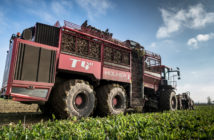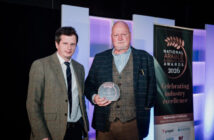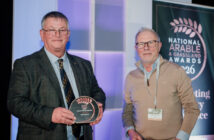New agri-tech at REAP includes world-first hopping robot that can identify, map and kill weeds
A hopping robot that can accurately target weeds; an affordable anaerobic digester for smallholders; a fast throughput screening platform for developing herbicides with different modes of action; and a way to neutralise the greenhouse gas from cattle burps. These were among the early-stage agri-tech companies presenting solutions to support sustainable agriculture in the Start-up Showcase at REAP, Agri-Tech East’s flagship conference. (
The ‘Innovating towards One Agriculture’ Conference looked at how food systems, human health, animal health and the environment are underpinned by innovation in the way food is produced.
The day started with a Farmers Breakfast and a presentation by Helen Ferrier, Science Advisor the NFU, around industry plans to reach net zero greenhouse gas (GHG) emissions across the whole of agriculture in England and Wales by 2040. The discussion revealed that although many of the farmers in the room were already on the journey towards this goal by prioritising sustainable agriculture on productive land and releasing marginal land for ecosystem services. However, there was a need for more science to underpin recommendations, particularly easy to use tools. As Rosie Begg, Head of Strategy for Gorgate Farms commented: “I have no idea how much GHG is produced by my farm, we need to establish a base-line before we can measure and manage it.”
Access to this agri-tech would enable a justification for land use and also a means for attaching a monetary value, for example, to the carbon captured. There was also a need for financial support to de-risk innovation.
A speaker in the keynote panel, John Crawford, until recently science director at Rothamsted Research, commented that agriculture was more than a sum of its parts. Considering food systems as an interconnected network was a more helpful approach.
He said: “I think the concept of One Agriculture is about how we create that transformation. How do we transform the food system so it does not just have a benign effect on the environment, it repairs the environment and supports human health? Because it does none of those things now.”
One of his predictions is that innovations in agri-tech will soon enable real time knowledge of food systems; “We will be having an environmental health forecast alongside the weather.”
The business opportunities created by a move towards sustainability were captured in a recent international IPPC report. Further case studies demonstrating how farmers had benefited from a more integrated ‘One Health’ approach to disease management were presented by other keynote panel speakers Simon Doherty, Senior Vice President of the British Veterinary Association (BVA), and Heleen Pinsen, project leader of the South Netherlands Farmers Union. These included strategies to overcome concerns of the public and improving management of disease outbreaks.
The Sofa Session provided an inspirational conclusion to the conference with early career farmers or technologist and scientist outlining what needs to change to realise the vision of One Agriculture. Improved collaboration was highly featured, along with the need to engage with the public in better ways.
Agri-Tech East is to bring together farmers and growers with scientists, technologists and entrepreneurs to create a global innovation hub in agri-tech.
Dr Belinda Clarke, Director of Agri-Tech East, explains: “Emerging agri-tech offers solutions to global challenges, and new thinking on good agricultural practice is not limited by age or geography as is seen by the increasingly national and international membership of Agri-Tech East and the origins on the companies in the Start-Up Showcase.
“The speakers and demonstrators at REAP showed that there is huge opportunity to create sustainable, productive and profitable farming enterprises – and a collaborative, systems-based or ‘One Agriculture’ approach will be the most effective way to achieve this,” Belinda concluded.
At REAP, Agri-Tech East announced it is partnering with the Missouri Partnership to provide a gateway to UK companies to the St Louis agri-food ecosystem, in the heart of US agricultural production. The Missouri Agri-Tech Connect Programme in February 2020 will include networking event and tailored meetings.




